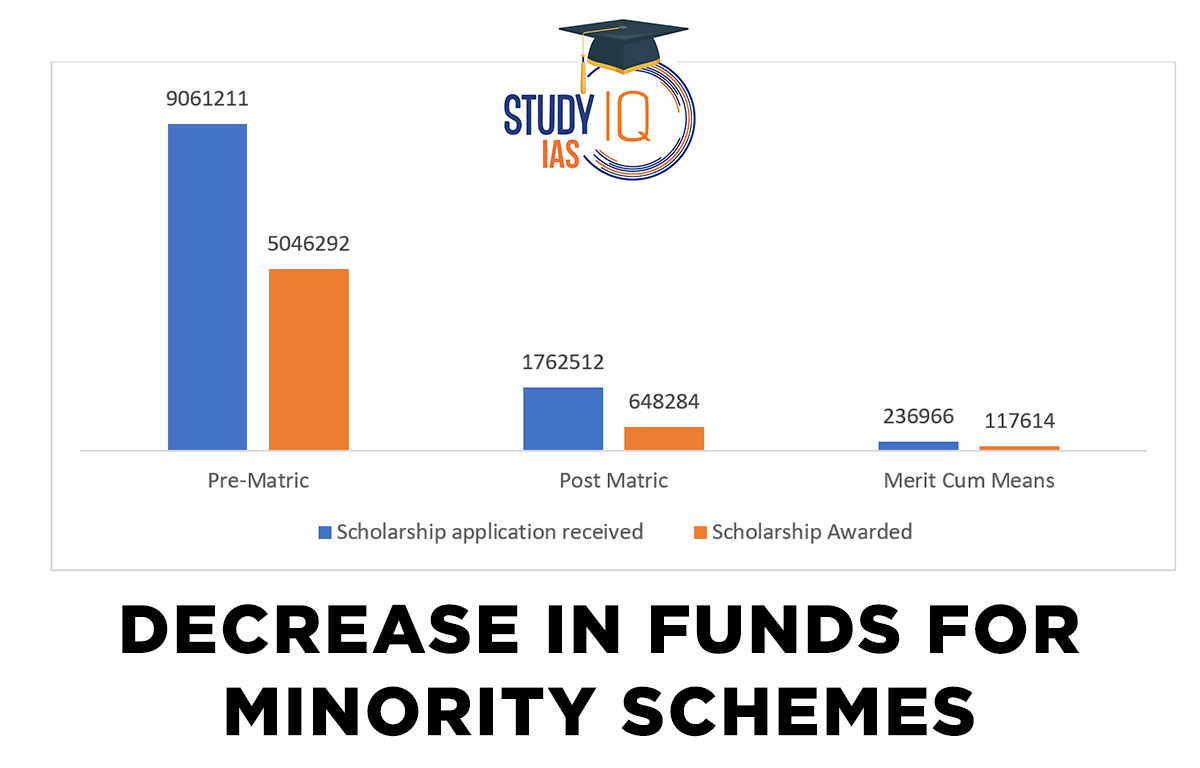Table of Contents
Context:Budget allocation for the Ministry of Minority Affairs was reduced by 38% for the financial year 2023-24 to the year 2022-23.
Highlight of Budget Allocation for Minorities
- Budgetary allocation for the Union Ministry of minority affairs fell from ₹5,020.50 crore in 2022-23 to ₹3,097.60 crore in 2023-24 – a slash of over 38 per cent from last fiscal.
- Declining Trend: Since 2012-13, a “declining trend” has been observed in the share of the overall budget expenditure towards minorities.
- Between 2006 and 2013, the budget allocation for the Ministry of Minority Affairs increased rapidly, starting from Rs.144 crore, to touch Rs.3,531 crore
- Reasons for reduction: As per the Union government, there has been an underutilisation of funds of over 47.96 per cent.
- Overlapping: Current programmes overlap and the interests of minority students are being met by other programmes.
- RTE Coverage: Students from Classes 1-8 are protected under the Right to Education Act, 2009, requiring the government to provide free and compulsory elementary education to all children.
- Pradhan Mantri Virasat Ka Samvardhan (PM VIKAS) Scheme has been added to the Ministry of Minority Affairs’ Budget. Budget for PMJVK was ₹1,650 crore last year which is reduced to ₹600 crore this year.
- It is an integrated scheme, converges five erstwhile schemes of the Ministry viz. Seekho aur Kamao, USTTAD, Hamari Dharohar, Nai Roshni and Nai Manzil.
- Aim: To adopt a family-centric approach, targeting beneficiaries from all minority communities, with special focus on artisan families, women, youth, and differently abled.
- Objective: To develop socio-economic infrastructure and basic amenities in the identified Minority Concentration Areas for improving the quality of life of the people in these areas and reduce imbalances as compared to the national average
- Four components of Scheme:
- Skilling and Training Component
- Leadership and Entrepreneurship Component, with credit support
- Education Component for school dropouts; and
- Infrastructure Development Component in collaboration with PMJVK scheme of the Ministry.
Minority in India
- The word ‘Minorities’ appears in some Articles of the Constitution, but is not defined anywhere.
- Article 29: Protection of interests of minorities.
- Article 30: Right of minorities to establish and administer educational institutions.
- Article 350(A): There shall be a Special Officer for linguistic minorities to be appointed by the President.
- Currently, only those communities notified under section 2(c) of the National Minorities Commission Act, 1992, by the central government are regarded as minority.
- Muslims, Christians, Sikhs, Buddhists, Parsis and Jains are ‘minority’ communities in India.
Impact of Decline in Budget
- Skill development training like Nai Manzil, USTAD got a Budget of mere ₹10 lakh, the same was ₹235 crore and ₹7 crore last year. The Budget for research schemes for minorities too has been slashed to ₹20 crore from ₹41 crore last year.
- This might lead to low skill development for the already marginalised minorities.
- Meritorious Students: Schemes under the Ministry of Minority Affairs that provides support for students clearing Prelims conducted by UPSC, SSC, and State public service commission got nothing in the ongoing financial year. The Budget for the same was 8 crore last year.
- Thus, the Meritorious students from poor minority families might find it difficult to study for the other stages of Public service examinations.
- Almost 50% cut is there in the special schemes for minorities which includes research, studies, publicity, monitoring and evaluation of development schemes for minorities, for conservation protection of the heritage of minorities and schemes for containing population decline of minorities.
- Various religious minorities, like Muslims, lag behind on development indicators despite the Centre’s schemes for minorities. Reduction in budget might further push them down the ladder of development.
- According to the findings of the 75th round of the National Sample Survey on education, 2017-’18, the dropout rate among Muslims is higher than among members of other religious minorities.
Steps taken to Promote Minorities in India
Scholarship Schemes
- Ministry of Minority Affairs is implementing three scholarship schemes for the educational empowerment of students belonging to the notified minority communities:
- Pre-matric scholarship: It is no longer applicable to students from Class 1 to Class 8.
- post-matric scholarship
- merit–cum–means based scholarship.
Maulana Azad National Fellowship Scheme
- For the minority community students pursuing higher education
- It has been scrapped.
Nai Udaan Scheme
- To help minority students prepare for the Union Public Service Commission examinations.
- It has been scrapped now.
Usttad
- Upgrading the Skills and Training in Traditional Arts/ Crafts for Development.
- To preserve the rich heritage of traditional arts/crafts of minorities.
Hunar Haat
- A platform wherein opportunity is given to minority artisans/craftsperson’s and culinary experts from across the country to showcase and market their finest handicraft and exquisitely crafted indigenous products.
Pradhan Mantri Jan Vikas Karyakram (Pmjvk)
- It is a Centrally Sponsored Scheme,
- Objective: To develop infrastructure projects, which are community assets, in the identified areas with development deficits for socio-economic development of the said areas.
‘Seekho Aur Kamao’ (Learn And Earn) Scheme
- It is a placement-linked skill development scheme for minorities
- Aim: To upgrade the skills of minority youth (in the age group of 14-45 years) in various modern/ traditional skills.
Hamari Dharohar Scheme
- For conservation of minorities’ culture and heritage.
National Commission For Minorities
- It is a statutory body under the National Commission for Minorities Act, 1992
- Commission has the following functions:
- evaluate the progress of the development of minorities under the Union and States.
- monitor the working of the safeguards provided in the Constitution and in laws enacted by Parliament and the State Legislatures.
- make recommendations for the effective implementation of safeguards for the protection of the interests of minorities by the Central Government or the State Governments.
- look into specific complaints regarding deprivation of rights and safeguards of the minorities and take up such matters with the appropriate authorities.


 Daily Quiz 17 April 2025
Daily Quiz 17 April 2025
 Nilgiri Biosphere Reserve, Map, Climate,...
Nilgiri Biosphere Reserve, Map, Climate,...
 Complete List of Indian State Animals
Complete List of Indian State Animals





















